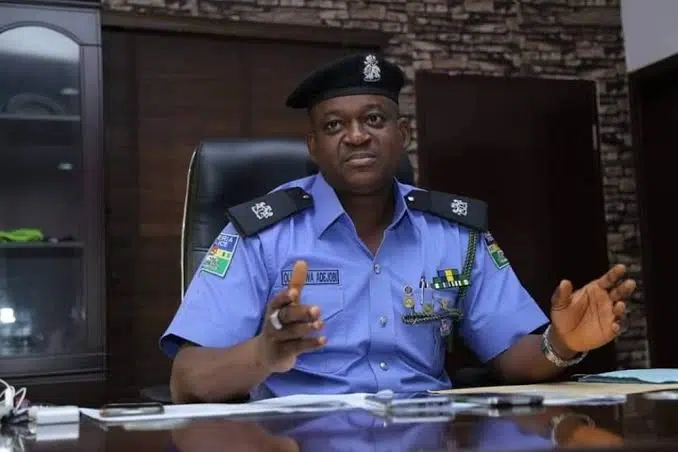People on the internet, including a lawyer named Inibehe Effiong, have educated the Force Public Relations Officer, Olumuyiwa Adejobi, about the 2024 Cybercrime Act.
Recently, the FPRO has been using the Act in conversations on social media, especially when interacting with people who criticized the government or the police.
But on Twitter, the netizens and Adejobi had heated debates about the police's interpretation of the law.
The controversy started when the police spokesperson posted a picture frame of the past Inspectors-General of Police in the country.
Adejobi captioned the frame, “Former and current indigenous IGPs in Nigeria. We celebrate you all (living and late)”
In response, a user called Lord Drey tweeted as @HommiesDrey and referred to the former IGPs as “Living and late criminals from the most corrupt civil organisation in the entire multiverse.”
In reply, the force spokesman wrote, “You will repeat it with evidence soon. It’s a matter of time.”
When asked further by another user, Adejobi said Lord Drey “needs to prove that all the past IGPs are corrupt or criminals. It’s a simple thing.”
He stated, “He should know that the only court that has jurisdiction over the Cybercrime Prohibition Act (Offences) is the Federal High Court. You gerrit?”
In another tweet, Adejobi wrote, “We need to understand that many Nigerians are not aware or deliberately claim to be ignorant of the law against cyberstalking or cyberbullying or fake news, most especially the Cybercrime Prohibition Act of 2015.
“We always like to wade in sentiments when the law is being enforced. It’s high time we faced the reality. Many victims of cyberstalking and the like are now aware of the act, and they are ready to pursue their cases. Simple.”
Meanwhile, responding to the FPRO’s threat, Winston Adeaete said Adejobi’s tweet was an intimidation against people for speaking up about the police.
“All you want to do is to intimidate people from speaking up, challenging and criticising the police whilst police rife. It is a lie! Swallow that intimidation. Swallow it,” he tweeted with an image of a Premium Times headline – “Police most corrupt institution in Nigeria- Survey.”
However, reacting to the exchange, human rights lawyer, Effiong, wrote, “It is disgraceful that the Force PRO has been alluding to a law that no longer exists in Nigeria.”
He added, “The provisions of the infamous Section 24 of the Cybercrimes (Prevention and Prohibition) Act, 2015 that the police have been using to harass Nigerians has been repealed by the National Assembly and replaced with a radically different and new provision.
“The amended Act was assented to by President Tinubu in February 2024. Under the new Act, posts which are injurious to a person’s reputation are no longer a crime. The new Act limits the offence of cyber-stalking to messages sent using a computer which are: pornographic; a threat to the life of another; or likely to lead to a breakdown of law and order.
The individual's post in question is not pornographic, life-threatening, or likely to cause a breakdown of law and order.
The lawyer's post stated that under the 1999 Constitution, an act is only considered an offense if it is clearly defined in a written law. Nigerians should disregard the Force PRO's statements.
He further called the 2024 Cybercrimes Act “a disadvantageous situation for the Nigeria Police Force.”
He concluded that the authorities are either unaware of the new law or have yet to understand its consequences.
The court will dismiss the unfair charges pressed against people for expressing critical views online.
Another user, @AtikuChangeDCh2, questioned whether laws are for the citizens or if citizens are meant to serve the law.
“Are laws for the citizens or are citizens meant to serve the law? Why are laws in Nigeria often used to restrain and confine citizens while criminal leaders and politicians continue their unlawful activities without challenge?” he wrote.
Also, @gbemiro mentioned cases of police extortion that were linked to the FPRO.
“When it comes to police corruption, you should stay out of it until issues are resolved,” the tweet said.
The National Security Adviser, Nuhu Ribadu, recently called for the full implementation of the Cybercrimes (Prohibition, Prevention, etc.) Amendment Act 2024, including the operationalisation of the National Cybersecurity Fund by all regulators and businesses specified in the second schedule of the Act.
In a statement signed by the head of his Strategic Communication Office, Zakari Mijinyawa, the NSA had expressed that the directive was part of efforts to secure Nigeria’s Critical National Information Infrastructure, counter-terrorism, and violent extremism, strengthen national security, and protect its economic interests.
On July 6, 2022, Nigeria became the 67th country to sign and ratify the Budapest Convention on Cybercrime, in line with Section 41(2)(a) of the Cybercrime Act 2015, which requires alignment of Nigerian cybercrime and cybersecurity laws and policies with international and regional standards.



